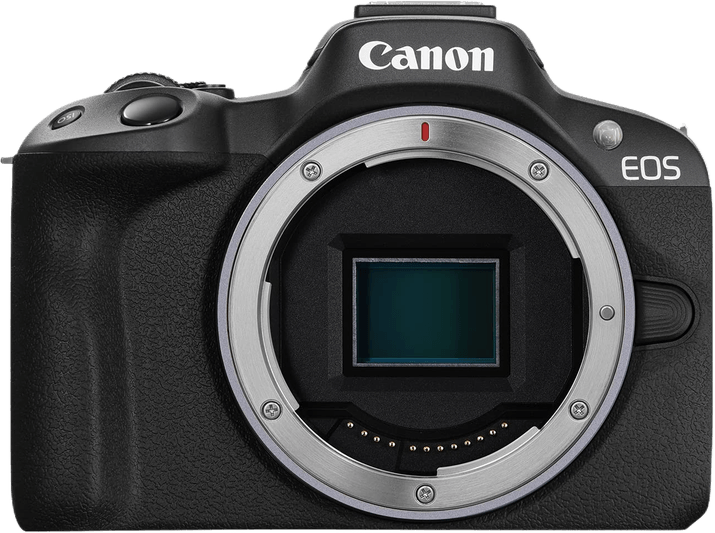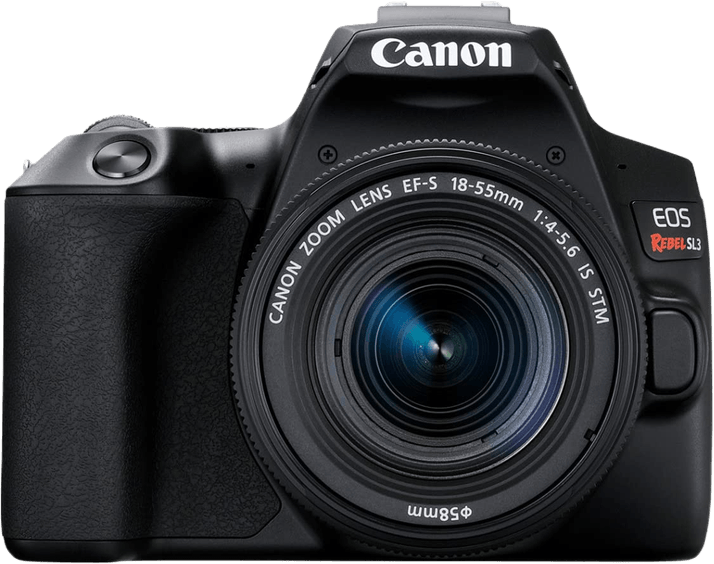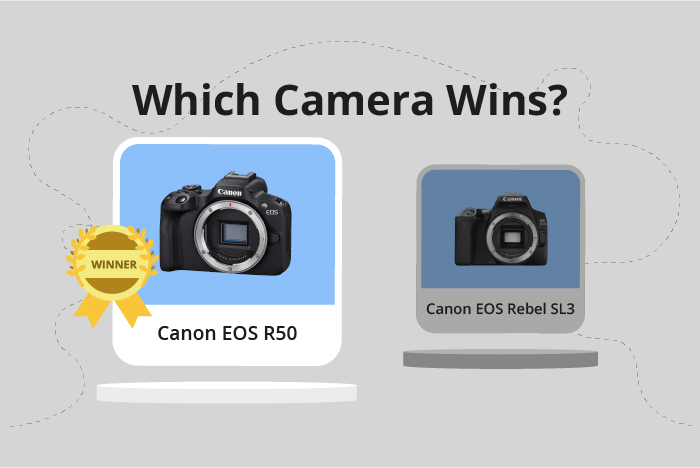Canon EOS R50 vs Rebel EOS SL3 / 250D Comparison
Canon EOS R50

Canon EOS Rebel SL3 / 250D

The Canon EOS R50 emerges as the winner with a score of 70/100, while the Canon Rebel EOS SL3 / 250D trails behind at 63/100. Both cameras share some common specifications, such as their respective announcement dates and release years – the R50 in 2023 and the SL3/250D in 2019.
The EOS R50 outshines the SL3/250D with its mirrorless design, lighter weight at 375g, and compact size of 116 x 86 x 69mm. This makes it more portable and convenient for on-the-go photography. However, the Rebel EOS SL3 / 250D boasts a lower launch price of $599, making it a more budget-friendly option.
Despite the SL3/250D’s affordability, the EOS R50’s superior performance and compact design make it a more attractive choice for photographers seeking a blend of quality and convenience.
Canon EOS R50 vs Rebel EOS SL3 / 250D Overview and Optics
The Canon EOS R50 surpasses the Canon Rebel EOS SL3 / 250D in optics, scoring 73/100 compared to the Rebel’s 61/100. Both cameras share several specifications, including a 24-megapixel CMOS sensor, an APS-C sensor size, and compatibility with Canon lenses. However, the EOS R50 outperforms the Rebel SL3 in several key aspects, while the Rebel SL3 has a few advantages of its own.
The EOS R50’s superior performance can be attributed to its faster shooting speed of 12 frames per second (fps), compared to the Rebel SL3’s 5 fps. This allows the R50 to capture fast-moving subjects more effectively. Additionally, the R50 features a more advanced Digic X processor, which contributes to faster processing and better overall image quality. The R50’s sensor also boasts a higher DXOMARK score of 94, compared to the Rebel SL3’s 64, indicating better performance in low-light conditions and wider dynamic range.
On the other hand, the Canon Rebel EOS SL3 / 250D offers built-in image stabilization, which the EOS R50 lacks. This feature can help reduce camera shake and produce sharper images, particularly in low-light situations or when using longer focal lengths. The Rebel SL3 also uses the Canon EF/EF-S lens mount, which provides a wider range of lens options, compared to the R50’s Canon RF mount.
In comparing the optics of the Canon EOS R50 and the Canon Rebel EOS SL3 / 250D, the R50’s faster shooting speed, advanced processor, and better sensor performance make it a stronger contender for those seeking higher quality images and action photography capabilities. However, the Rebel SL3’s built-in image stabilization and broader lens compatibility may appeal to photographers who prioritize versatility and steadiness in their images.
Canon EOS R50 vs Rebel EOS SL3 / 250D Video Performance
The Canon EOS R50 emerges as the winner in video capabilities with a score of 91/100, while the Canon Rebel EOS SL3 / 250D follows closely with a score of 83/100. Both cameras share common video features, including a maximum video resolution of 4K and video dimensions of 3840 x 2160. Additionally, both cameras have built-in time-lapse functionality.
The EOS R50 outshines the Rebel EOS SL3 / 250D in terms of maximum video frame rate, offering 120fps compared to the latter’s 60fps. This advantage allows the EOS R50 to produce smoother slow-motion video and capture fast-moving subjects in greater detail.
On the other hand, the Rebel EOS SL3 / 250D does not possess any distinct advantages over the EOS R50 in video capabilities. However, its slightly lower score may not necessarily mean it is a poor choice for video enthusiasts. It still offers 4K resolution, 3840 x 2160 video dimensions, and time-lapse functionality, making it a suitable choice for many users.
Considering the video specifications, the Canon EOS R50 clearly outperforms the Canon Rebel EOS SL3 / 250D, especially when it comes to capturing fast-moving subjects or creating slow-motion videos. The Rebel EOS SL3 / 250D remains a viable option for users who do not require the higher frame rate offered by the EOS R50. Ultimately, the choice between the two cameras should be based on the user’s specific needs and preferences in video capabilities.
Canon EOS R50 vs Rebel EOS SL3 / 250D Features and Benefits
The Canon EOS R50 wins the feature comparison with a score of 72/100, while the Canon Rebel EOS SL3 / 250D scores slightly lower at 70/100. Both cameras share several specifications, such as a 3-inch screen size, touchscreen capability, flip screen, GPS absence, and WiFi and Bluetooth connectivity.
The EOS R50 excels with its higher screen resolution of 1,620,000 dots, compared to the Rebel SL3 / 250D’s 1,040,000 dots. This higher resolution provides the R50 with a clearer and more detailed display, allowing for better framing and reviewing of photos and videos. The two-point difference in the feature score demonstrates the superiority of the EOS R50 in this aspect.
On the other hand, the Rebel EOS SL3 / 250D, despite having a lower feature score, offers advantages in other areas, such as its lightweight and compact design. This makes it more portable and suitable for travel photography or casual use. However, this advantage does not directly relate to the feature score comparison.
Considering the above points, the Canon EOS R50 is the better option for those who prioritize a higher screen resolution and overall feature set. Meanwhile, the Canon Rebel EOS SL3 / 250D remains a viable choice for users who value portability and a smaller form factor. Both cameras offer similar specifications in terms of screen size and connectivity, making the decision ultimately dependent on individual preferences and priorities.
Canon EOS R50 vs Rebel EOS SL3 / 250D Storage and Battery
The Canon Rebel EOS SL3 / 250D outperforms the Canon EOS R50 in storage and battery, earning a score of 45/100 compared to the R50’s 35/100. Both cameras share common specifications, including one memory card slot and compatibility with SD, SDHC, and SDXC memory cards. However, the Rebel EOS SL3 / 250D only supports UHS-I, while the EOS R50 is compatible with both UHS-I and II.
The Rebel EOS SL3 / 250D’s main advantage is its superior battery life, offering 1070 shots compared to the EOS R50’s 370 shots. Both cameras use the same battery type, the LP-E17. In contrast, the EOS R50 has the added benefit of USB charging, which the Rebel EOS SL3 / 250D lacks.
Considering these factors, the Rebel EOS SL3 / 250D is the better choice for extended shooting sessions due to its longer battery life. However, the EOS R50 offers more versatility in memory card compatibility and USB charging convenience.
Canon EOS R50 vs Rebel EOS SL3 / 250D – Our Verdict
Are you still undecided about which camera is right for you? Have a look at these popular comparisons that feature the Canon EOS R50 or the Canon Rebel EOS SL3 / 250D:

